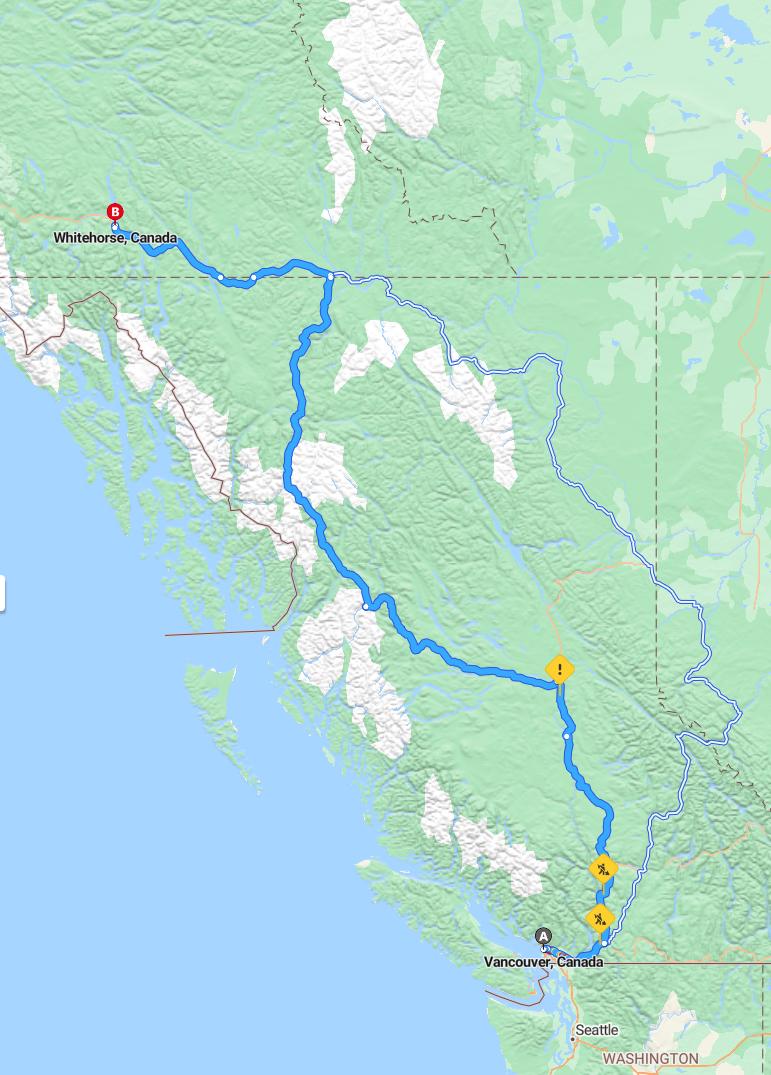Distance and estimated driving time
The drive from Vancouver to Whitehorse is approximately 1,492 miles and is estimated to take around 25 hours and 42 minutes, offering an adventurous cross-country experience. The route primarily follows TC-16 W and BC-37, guiding travelers through breathtaking landscapes and remote wilderness areas. Planning a trip of this length requires careful preparation, including vehicle maintenance, overnight stops, and meal arrangements, to ensure a safe and enjoyable journey. This scenic route provides travelers with an opportunity to explore diverse environments, from urban Vancouver to the rugged terrains of northern Canada.
Driving route
Embarking on a journey from Vancouver to Whitehorse offers a spectacular traverse through British Columbia. This route takes travelers through diverse landscapes, from lush forests to rugged mountain terrain. Along the way, numerous smaller towns and communities provide opportunities to experience local culture and scenery. The trip culminates in Whitehorse, the vibrant capital of Yukon, renowned for its rich history and breathtaking wilderness. Overall, this drive promises an unforgettable adventure through Canada's striking northern landscapes.

Road conditions and weather updates
Travelers driving from Vancouver to Whitehorse should stay informed about current road conditions and weather updates, as the journey spans diverse terrains and climates. In British Columbia, highways can be affected by seasonal snow, rain, or fog, which may impact driving safety, especially in mountainous regions. As you progress northward, particularly approaching Whitehorse, colder temperatures and winter weather can lead to icy roads and snow accumulation, necessitating cautious driving and proper vehicle preparation. Regularly checking local transportation authority advisories and weather forecasts ensures a safer and more prepared trip through this scenic but challenging route.
Best stopping points and rest areas
When driving from Vancouver to Whitehorse, travelers should plan for strategic stopping points to ensure a comfortable journey. Popular rest areas include notable spots in British Columbia where travelers can refuel, enjoy scenic views, and take rejuvenating breaks. Along the route through smaller towns, there are often designated rest areas or services offering food, fuel, and amenities to refresh before continuing. Ultimately, the most ideal stopping points are during extended stretches, allowing drivers to rest and explore local attractions en route to Whitehorse, making the journey both safe and memorable.
Scenic spots and viewpoints along the route
Traveling from Vancouver to Whitehorse offers an array of breathtaking scenic spots and viewpoints that showcase the region's natural beauty. Starting in Vancouver, travelers can enjoy views of the towering mountains and lush forests, especially as they begin their journey northward through British Columbia. Along the way, numerous small towns and parks provide opportunities to stop and take in the stunning landscapes, including expansive lakes and dense woodlands. Approaching Whitehorse, travelers are greeted with awe-inspiring vistas of rugged mountains and pristine wilderness, making the drive an unforgettable visual experience.
Accommodation options in Whitehorse
Whitehorse offers a variety of accommodation options to suit different preferences and budgets. Visitors can choose from cozy hotels, charming bed-and-breakfasts, and modern motels that provide comfortable amenities. There are also available rental cabins and lodges for those seeking a more rustic experience, often located near natural attractions. Additionally, several campgrounds and RV parks are available for travelers wishing to enjoy Whitehorse's scenic outdoor environment.
Essential travel tips and safety advice
When driving from Vancouver to Whitehorse, it is essential to prepare thoroughly for your journey, including ensuring your vehicle is in good condition and stocked with emergency supplies such as food, water, and a first aid kit. Since the route passes through remote areas and varying weather conditions, it is important to check the weather forecast regularly and plan your stops accordingly. Maintain regular communication with friends or family, especially when traveling through areas with limited cell service, for added safety. Lastly, drive cautiously, adhere to posted speed limits, and be prepared for potential wildlife crossings or unpredictable road conditions along this scenic yet challenging route.
Vehicle preparation for long-distance driving
Preparing your vehicle for long-distance driving from Vancouver to Whitehorse is essential to ensure a safe and smooth journey. Start by conducting a comprehensive inspection, including checking tire pressure and tread, fluid levels, brakes, and battery health. It's also wise to carry emergency supplies such as a spare tire, jumper cables, first aid kit, and extra food and water. Additionally, ensure your navigation system or maps are up-to-date, and consider planning for potential weather changes and remote areas along the route through British Columbia and into Yukon.
Local attractions and activities in Whitehorse
Whitehorse, the capital of Yukon, offers a variety of local attractions and activities that showcase its rugged natural beauty and rich history. Visitors can explore the Yukon Wildlife Preserve to observe native animals in their natural habitat or enjoy outdoor adventures such as hiking, fishing, and kayaking along the scenic route of the Yukon River. The city also features cultural experiences at the Kwanlin Dun Cultural Centre, which highlights Indigenous traditions and art. Additionally, outdoor enthusiasts can visit nearby wilderness areas for opportunities like mountain biking and snowshoeing, making Whitehorse a vibrant destination for nature lovers and history enthusiasts alike.
Fuel stations and availability along the route
Traveling from Vancouver to Whitehorse offers several fuel station options along the route, ensuring convenient refueling opportunities for travelers. Major towns and cities such as Vancouver and Whitehorse are well-equipped with numerous fuel stations, providing easy access to gasoline and diesel. Throughout the journey, especially in smaller towns and along remote stretches, fuel availability may be limited, so it is advisable to plan ahead and fill up when possible. Overall, while fuel stations are plentiful in urban areas, travelers should remain mindful of the distances between stations in more isolated regions to avoid running out of fuel.
